
Feature image courtesy of Ajanette Photography
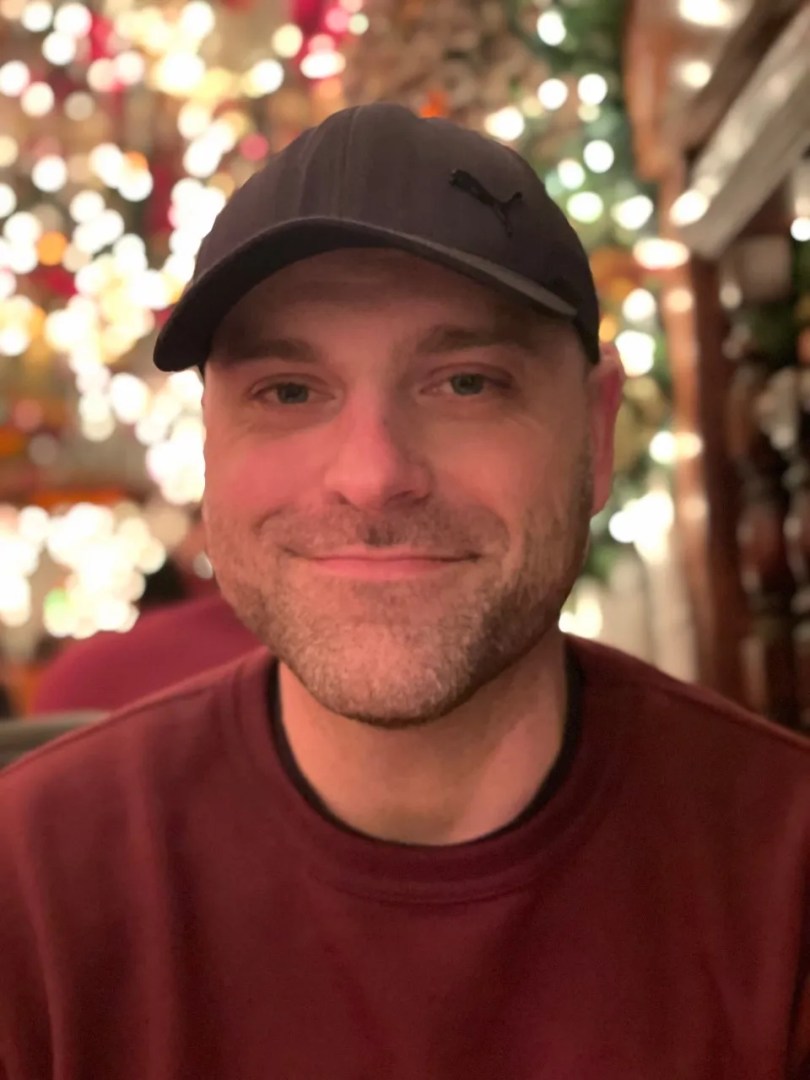
By Andrew Daly
[email protected]
With origins nestled in the sleepy suburbs of Long Island, NY, Freddy Villano has forged an unlikely career in rock and metal music as one of the more reliable bassists amongst a deep scene.
Like many contemporaries, Villano was influenced by the likes of John Paul Jones, Gene Simmons, Geezer Butler, and other 70s heroes, and after a chance run-in with seminal 70s live album, KISS Alive II, Villano sights were all but set on a career in rock music.
After bouncing from Lazarus to Redline to Widowmaker, with stops including Quiet Riot, and Dee Snider’s band intertwined along the way, Villano has settled in with veteran outfit, The Rods, who were in need of Villano particular brand of 4-stringed help.
Settling in with The Rods, and filling a position once ably maneuvered by the likes of Craig Gruber, and Steve Starmer, Villano has acclimatized as an elder statesman, all the while proving the much-needed bedrock which will allow The Rods to continue on.
From his home in Ithaca, NY, Villano recently ran through his long and varied career with me, discussing in detail the trials and tribulations which shaped both the man and the player.
Andrew:
As a young musician, what was the moment which first sparked your interest in music?
Freddy:
It had to be getting KISS‘ Alive II for Christmas in 1970-something. It was on vinyl because I’m that old. [Laughs]. I can’t remember if I asked for it, or it was just some extraordinary insight on the part of Santa, but that album, and KISS in general, made me want to play drums, which is what I did for the first few years of my pre-pubescent musical life. I had an old, clear, Fibes vista-lite kit on loan from my uncle Jerry “Gigi” Barberine, a drummer, who was president of D’Angelico in the 80s. I wish I still had that kit.
Andrew:
Who were some of your earliest influences that first shaped your style?
Freddy:
So, after recognizing I was into KISS, my sister’s boyfriend, Nunzio (who showed up at our house the first time wearing a t-shirt that read, “…and on the eighth day God created The Doors“), brought over Heaven and Hell and Sabotage, both Black Sabbath, Dio-era and Ozzy-era respectively. I went from playing drums to wanting to play bass. I got a Guild B-301 and the rest is history. [Laughs]. Nunzio also took me to my first concert. I think I was in the 7th grade. Iron Maiden at the North Stage Theater in Glen Cove on Long Island. The Number of the Beast tour. The opening act? The Rods. Talk about serendipity. [Laughs]. So, Geezer Butler, Steve Harris, and Bob Daisley on the first two Ozzy records; were all relevant to my musical upbringing as a bass player and they all continue to inspire me. I also grew up around an obscene amount of crazy talented musicians on Long Island, so bass players like Tommy Henriksen, Greg Smith, James LoMenzo, Teddy Cook, Bonnie Parker, Schuyler Deale, to name a few, were all performing locally when I was sneaking into clubs and first learning how to play.
Andrew:
How would you say that style has evolved as you’ve moved through your career?
Freddy:
As for the evolution, I would say that at some point I stopped trying to be John Paul Jones. [Laughs]. Instead, I just got comfortable in my own skin and what it is that I have to offer. There are times when I’m playing and I can hear a little bit of Steve Harris pop out, or I’ll play something reminiscent of Bob Daisley. I’m not saying I’m nearly as good, but their influence is certainly still in there, all jumbled up, and sometimes it seeps out. Hopefully, it all gets channeled through the lens of my own experience, sound, style, etc. It’s an eternal quest.
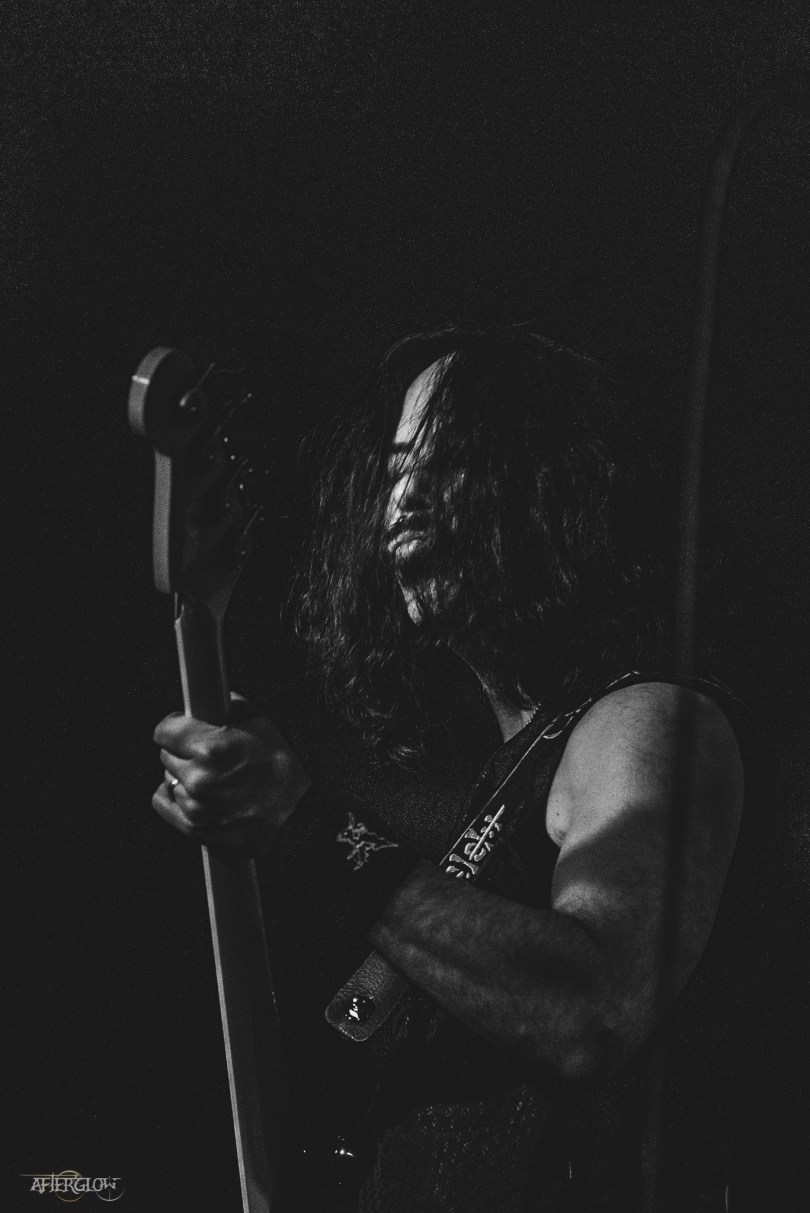
Andrew:
What were some of your earliest gigs where you first cut your teeth?
Freddy:
My first band was called Lazarus, with friends from high school. We rehearsed at my house, in the basement, because I had a drum set and bass rig. The two guitar players shared one amp at first. I had 80% of our backline. [Laughs]. We played Maiden, Sabbath, Judas Priest, Ozzy, and Mötley Crüe. From there I joined an original band called Redline (later called Rock Asylum,) and wound up in L.A. doing showcases for Engima Records and performing during the height of the 80s Hollywood glam scene out there in like ’86, and ’87. We played all the legendary haunts, like The Troubadour, Gazzarri’s, etc. After that, I went to the Musicians Institute for a year, then came back to New York and cut some demos with Gari Saint, who was with Tangier for a spell. And then spent about a year doing demos with a band called Holy Water (more recently reimagined as American Mafia) that was being produced by Al Greenwood from Foreigner. Then Nirvana hit and that project (and many like it) got shelved. There’s lots more, but that’s it in a nutshell.
Andrew:
Take me through you joining The Rods.
Freddy:
Ten years ago I moved from NYC to Ithaca, NY, and started getting involved in the local music scene in Central New York. In 2014 I joined Ten Man Push after Tom Jude (Holy Water/American Mafia guitarist) and I asked John West (Royal Hunt, Cozy Powell, Classic Rock Show), who lives in the area, to sing a few songs on what would become Rock N’ Roll Hit Machine. He did an outstanding job, as per usual, and then, shortly after, asked me about joining TMP. They had been an original, national, touring act prior to my involvement, but were mostly playing regionally and doing a lot of covers by the time I joined.
Anyway, great band either way and those guys (Westy, Lonnie Park, and Nate Horton) really made me feel like part of the family. They endured all of my learning curves with their material with great patience and encouragement over the course of a few years. And we’ve become great friends. Playing with them exposed me to a lot of the other area musicians including the guys from The Rods.
Sometime around 2016, I ended up playing bass on Rock’s tribute to Dio, Hail, and Farewell (which Lonnie produced, incidentally), and played a couple of regional gigs with Carl in a band called Held Hostage. I also became bass buddies with Garry Bordonaro over these years. So, all that being said, when Garry decided to retire from The Rods, Rock and Carl asked if I’d be interested in playing with them. Then the pandemic hit. My joke with Garry since then has been, “Thanks a lot for handing off your gig right before a pandemic!” [Laughs].
Andrew:
What was the audition process like? Were any other notables competing?
Freddy:
I don’t know if anyone else was considered, but I think my auditions were the Held Hostage gigs with Carl and tracking bass for the Feinstein record, Hail and Farewell. Those experiences seemed to go well enough to earn their trust.
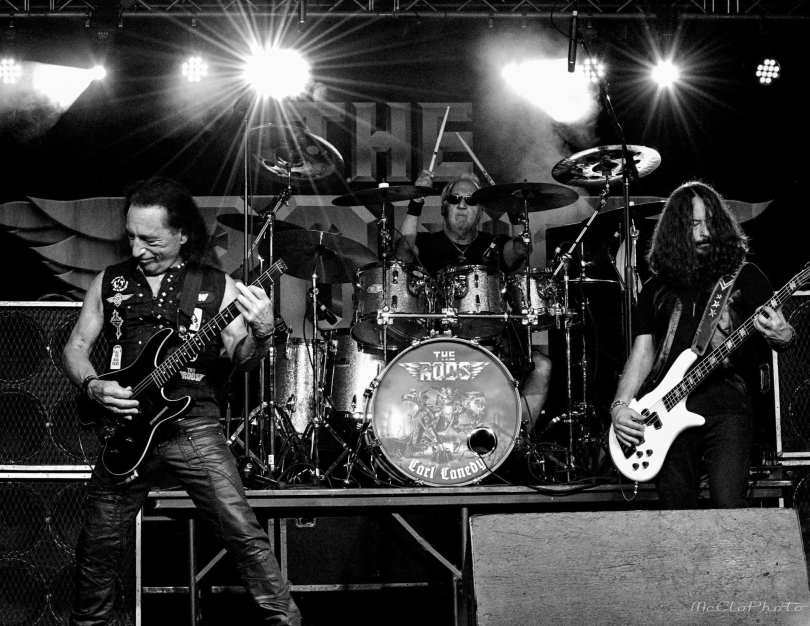
Andrew:
How does your style lend itself to that of The Rods?
Freddy:
That’s a great question. I think being weened on Sabbath and Dio and Maiden certainly helps. Having played with great drummers like Joe Franco (Widowmaker), Frankie Banali (Quiet Riot), John Macaluso (Redline), AJ Pero (Dee Snider), etc. certainly set me up for playing with a drummer of Carl’s caliber. Same with the guitar. I have played with many great guitarists throughout my career and I think I know how to listen to what’s going on and approach bass from the perspective of how to best support what someone like Rock might play.
As a bass player, I mostly try to enhance what’s already going on, particularly in a band like The Rods where Rock and Carl are so identifiable. So, it’s never about me or my bass playing per se. It’s more about how I honor the history of The Rods and their immense back catalog, as well as the bass players who came before me (Garry, Craig Gruber, Steve Starmer), all of whom I have great regard for, and complete the picture, simply by making it as powerful as it can be.
Andrew:
With that in mind, how do you go about translating the classic tracks, while still making them your own?
Freddy:
It’s basically understanding the format. Rock and Carl are going to play the songs exactly the way they’ve been playing them, so it would be weird for me to come in and suddenly try to play like Geddy Lee or Billy Sheehan when that’s not what the songs call for if you know what I mean. I basically stick to the script and find moments where a little bit of my own personality might fit, without taking away from the arrangements. A good example would be the song “Louder Than Loud.” There’s a breakdown just before the guitar solo that’s just bass and kick drum. The bass plays a variation of the song’s main riff. I suppose I could’ve gone off and done a little solo or something, but I decided instead to stick to the motif and spice that up with some distortion and wah to create an atmosphere that I felt was appropriate to the sound and style of the band. It’s got to sit within The Rods container and draw the audience into an experience. Again, not about me or my chops, per se.
Andrew:
What makes this version of The Rods the band’s fiercest yet?
Freddy:
I could say, “me!” [Laughs]. But that would be totally presumptuous and not true. You have to understand that Rock and Carl played with Garry for 40 years or whatever. That’s a long time. And I totally respect that and honor it, I hope. So, while the three of us had immediate chemistry, and that has evolved throughout the rehearsal process, it’ll take some time before it’s as intuitive as it likely was with Garry. Responding to each other’s impulses in the heat of battle only comes from lots of gigs, lots of touring, and writing and recording lots of songs together. There’s no substitute for that. Having said that, I really think their last album, Brotherhood of Metal, was one of their best, and fiercest ever, if not their best. Especially from a production point of view. But maybe even songwriting too. So, with this new record, the gauntlet has kind of been laid at our feet, even if by ourselves, to come up with something as good or better. Otherwise, why bother? Right? So, we have to be fierce because Brotherhood is holding our feet to the flames.
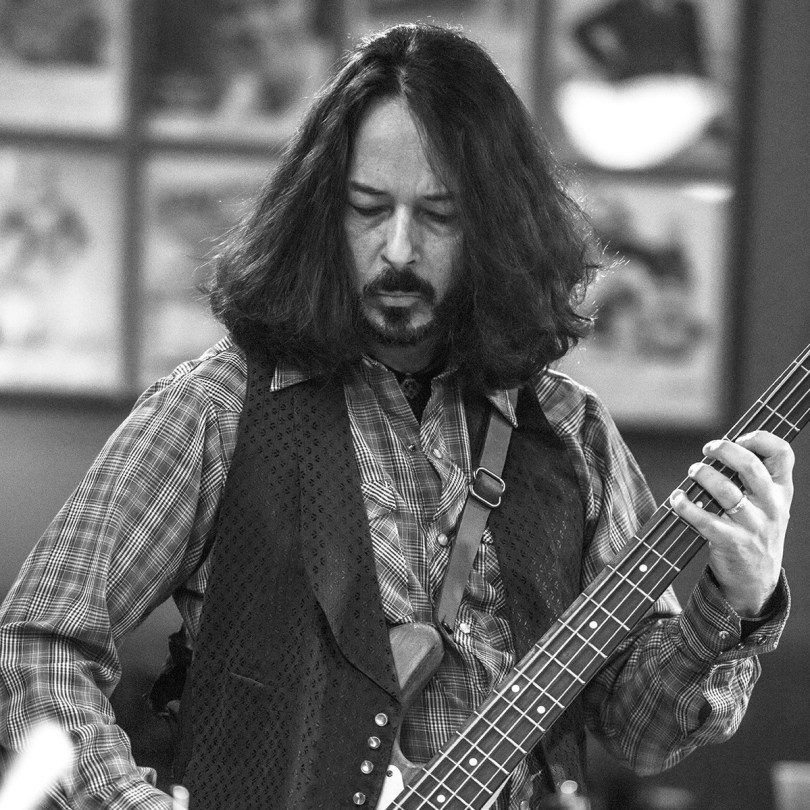
Andrew:
I wanted to go back a bit now stating with Quiet Riot. You were in the band for a short time from 1995-1996. What brought you into the fold?
Freddy:
First, you should know, probably the second concert I ever attended was Black Sabbath on the Born Again tour with Quiet Riot opening. Crazy, right? The Rods, Quiet Riot…do you see a pattern here? [Laughs]. So, I was on tour with Widowmaker and I kept seeing posters for Quiet Riot at many of the same venues. They were hot on our heels around that time, tour-wise. [Laughs]. At a Widowmaker show in Amarillo, Texas Joe Franco got his hand slammed in the van door, so it basically derailed the rest of that tour. A week later I was at home wondering what I was going to do and I got a phone call from Kevin DuBrow saying that they were on the road and needed a replacement fast.
At first, I didn’t believe it. I thought it was a prank. [Laughs]. Anyway, he got my name and number from Bobby Rondinelli (Rainbow, Black Sabbath), who played with them for a bit, a few years prior. Bobby basically knew me from Long Island and knew that if I was playing with Al Pitrelli (guitar) and Joe in Widowmaker then I had enough pedigree for Quiet Riot. Indeed, I use to tell people that playing with Al and Joe gave me instant credibility because those two are what I call “industry” household names.
Anyway, after our chat, I got some cassette tapes of their show (Fedex’d most likely), learned everything in a couple of days, flew to and met up with them in Louisville, Kentucky, rehearsed once, then drove to my first gig in Grand Rapids, Michigan, and off we went. It was a magical time. I can remember standing on stage literally pinching myself looking at Kevin, Carlos, and Frankie, and just soaking in the fact that I was playing with the Metal Health line-up. It was so surreal.
Andrew:
With the band in transition, you never got to record a record. Are there any regrets there?
Freddy:
Absolutely. I would love to have been on a record with Kevin, Carlos, and Frankie. But that’s not anything that I ever had any control over. And besides, the environment wasn’t really conducive to releasing new product at that time. Even though we were touring in support of Down to the Bone, which was released independently, that time period was mostly about touring and staying afloat through performances, not record sales, by the time I got there. What does exist, which would be great to see get released someday is a live concert from that tour. VH-1 came out to a show in Idaho, I think it was, to film us for a special called, It Came From the Eighties. It featured Quiet Riot, Men At Work, Apollonia, etc. They filmed the entire show. Three-or-four-camera shoot. So, that exists in a vault somewhere. Frankie told me he had tried to acquire some of that footage for the documentary he put together a few years back, but I don’t think it ever happened.
Andrew:
What led to your departure?
Freddy:
They put the original lineup back together with Rudy Sarzo for a Marilyn Manson party, and they were off and running again. That’s always a risk, being the new guy. But it’s cool. I love Rudy and he was certainly a big influence when I was coming up. The bass chair belongs to him ultimately (and Chuck Wright too). I just kept his seat warm for a spell. That’s how I keep these kinds of gigs in perspective.
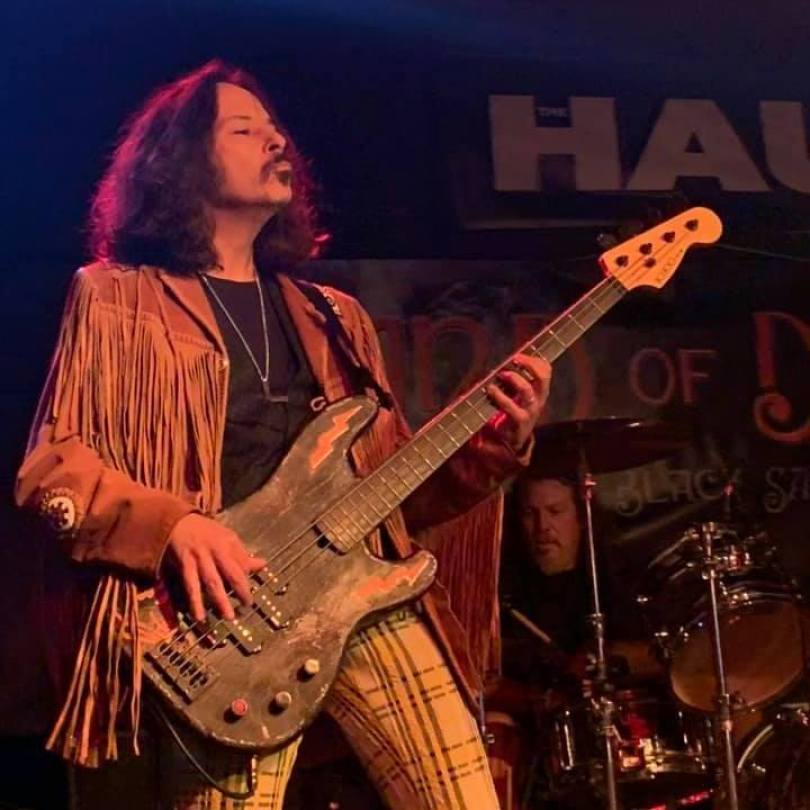
Andrew:
Walk me through your time with Dee Snider, which seemed to be brief too. Why didn’t you stick there?
Freddy:
By the time I joined Widowmaker, grunge was all the rage, so we were having a tough time selling tickets on the road. Also, it became apparent that most people were coming to hear Twisted Sister songs, despite those two Widowmaker albums being complete masterstrokes. Both incredible albums, truly. The tribute band thing was starting to take shape, culturally speaking, and I think Dee realized, even without a full-on Twisted Sister reformation, he could go out and do a whole Twisted show, before anyone else got the idea, and sell that more easily than Widowmaker. I was a little bummed that he didn’t ask me, but at the time he wanted to keep the two projects separate, I suppose thinking that Widowmaker might continue, which it didn’t. Fortunately, I got to headline Sweden Rock with him in the summer of 2001. That was fun, and I love all the classic Twisted stuff, which I grew up around on Long Island.
Andrew:
In your estimation, what are the top five metal albums of all time?
Freddy:
I’ll go with my top five essential listening records for rock bass players IMHO (not in any particular order): Heaven and Hell by Black Sabbath Killers by Iron Maiden, Ritchie Blackmore’s Rainbow, Diary of a Mad Man, and Blizzard of Ozz by Ozzy Osbourne (cheating! two for one!), and Led Zeppelin II.
Andrew:
If you could share the stage with anyone, who would it be and why?
Freddy:
You might be surprised by this answer but I’m going to go with probably my favorite singer/songwriter of all time, Charlie Sexton. I just absolutely love what he did with Arc Angels, saw him many times with Bob Dylan, and think he’s the consummate well-rounded musician and producer, comfortable being out front or supporting someone else. The work he did on Lucinda Williams’ Essence is just off the hook. I love that album so much.
Also, I saw the Arc Angels play back when they first came out, like ’94 or something, in a tiny club on Long Island (I think it was the Stage Door, or Sparks, in Deer Park), and I was blown away by the fact that someone could just be so cool on stage. He didn’t have to jump around like most of the 80s bands were doing at that time. I was never comfortable with that kind of stage presence myself and often felt kinda forced to perform like that, so seeing Charlie provided me with a glimpse of the possibilities outside of the genre I had been around most of my life until then.
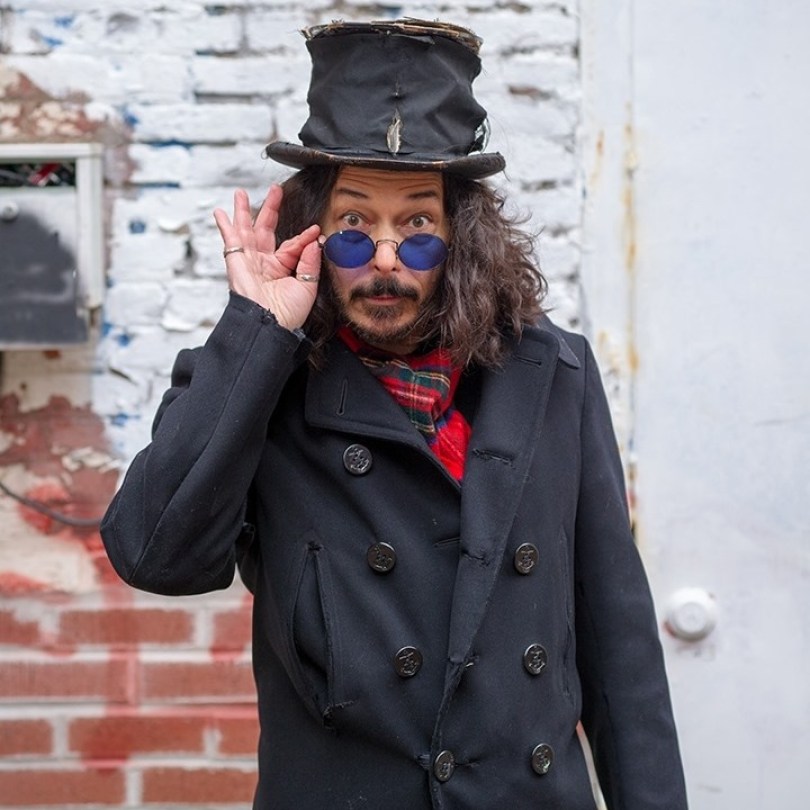
Andrew:
Going forward, what are your goals that you’ve yet to accomplish, and how do you plan to make them a reality?
Freddy:
The immediate goal is recording the new/next Rods record, Shockwave. We are basically in the midst of doing that now, so aside from the minor detour of preparing for the shows we’re playing regionally this summer, that’ll be my main focus. Other goals include other recording projects, but they’ll have to wait until Shockwave is in the can.
Andrew:
What sort of gear are you using?
Freddy:
Live, I’m using a white Euro Spector NS-2 and Ampeg Amps through custom-built 4×12 cabs with 80-watt Celestion Speakers. The 4x12s are new for me. They belong to Rock. I’m really digging the tone I’m getting. Geezer and Steve Harris both used 4x12s, so I’m in good company.
Andrew:
Last one. What’s next for you in all lanes?
Freddy:
I would just say new music from various endeavors that are in various stages of completion, or yet to be done. A few years ago I did some recording with David Bowie guitar legend Earl Slick. The instrumental part of those sessions was released last summer on Schnitzel Records. It’s called Fist Full of Devils. The vocal side, with Michael Houghton singing, should hopefully come out next year under the Outliers moniker, also on Schnitzel.
- Andrew Daly (@vwmusicrocks) is the Editor-in-Chief for www.vwmusicrocks.com and may be reached at [email protected]
